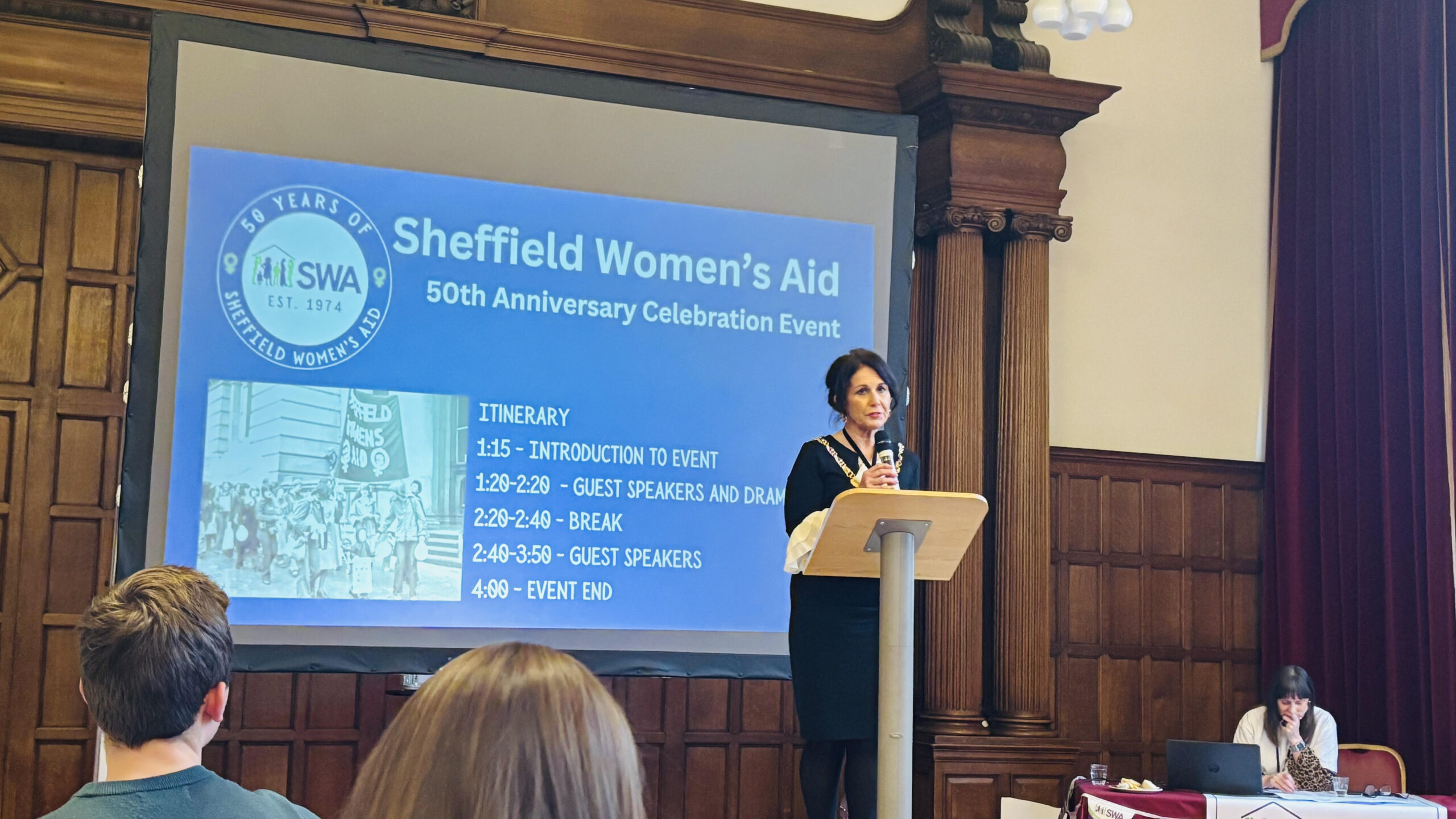
“We shouldn’t still be here”: Sheffield Women’s Aid turns 50
For 50 years, Sheffield Women’s Aid has been a lifeline for survivors of domestic abuse, providing refuge to women and their children, as well as reshaping attitudes around gender-based violence.
Despite the ongoing work to help those impacted by violence against women and girls (VAWG) the problem has been classed as a societal epidemic by UK police.
This week’s 50th anniversary is bitter-sweet for Chief Executive, Hollie Venn.
She says: “It’s a real privilege for me to be in this role at the time we are 50, but it’s very sad that we are still here, we shouldn’t still be here. There have been changes in social attitudes and as a society we know it's unacceptable.
“We are more in agreement now that domestic violence is not just something that happens behind closed doors.”
In spite of positive changes in attitudes towards domestic violence, there are still over 85,000 adults living in Sheffield who have experienced domestic abuse since the age of 16, according to Sheffield City Council.
Sheffield Women’s Aid is committed to offering a safe space for survivors and their children. They provide two separate housing units with self-contained flats for 36 women and their children.
How VAWG still needs to be tackled
While there have been positive changes in the past 50 years, Ms Venn believes there’s still a long way to go, with technology and social media presenting new challenges.
She says: “What I don’t think we could have anticipated is the rise in hatred towards women that has definitely been creeping up over the past few years.
“There has been a big set back in societal attitudes because of people like Andrew Tate. I think social media has a large responsibility for that.
“Many young boys just parrot what they hear on social media.”
Research by Women’s Aid in 2023 found that, among youths aged 7–25 years, boys are more likely than girls to be exposed to gendered hateful content on social media, and that this exposure is linked to unhealthy attitudes towards relationships.
The solution, Ms Venn believes, lies in education. She emphasised the need for efforts and resources to be invested in schools to educate young children about the importance of respecting women.
Social media isn’t all negative, though. The platforms have also helped to create a positive impact on shaping positive attitudes towards gender-based violence.
Ms Venn says: “What is really heartening is when I see a lot of young women posting on social media about feminism and pushing back on the misogyny they experience.”
Recent high profile domestic abuse cases, such as Gisèle Pelicot, who was raped by her husband and over 50 men while she was incapacitated, have sparked solidarity among women and reduced stigma around domestic abuse, with social media users promoting slogans like “shame must change sides”.
Despite the challenges, Sheffield Women’s Aid remains optimistic about the future and the impact they strive to have. The charity is currently developing a range of accommodation and working in partnership with organisations like WISH to meet the high demand for women and children affected by abuse.
Sheffield Women’s Aid shaping change
The charity has been at the forefront of influencing life-changing legislation making the UK safer for women.
Their impact dates back to 1977, when they successfully lobbied for Sheffield City Council to allow female survivors of domestic violence to be classified as homeless, granting them access to housing support. In 2015, they supported the development of the Femicide Census, which recorded all fatal domestic abuse cases.
One of the biggest milestones in legislation during Sheffield Women’s Aid’s existence was the passing of the Domestic Abuse Act in 2021.
Ms Venn said the introduction of this major bill was the result of years of campaigning from Sheffield and other branches of Women’s Aid.
The Act provided the first ever statutory definition of domestic abuse, finally recognising the existence of emotional and psychological harm, economic abuse, and coercive control.
Julie O’Rourke, a Lead Practitioner at Sheffield Women’s Aid, explained: “The domestic abuse bill made a lot of changes. Coercive control was rarely spoken about before, it’s a big milestone that the different forms of abuse are now being recognised.”
According to Women’s Aid, 43,774 offences of coercive control were recorded by the police in England and Wales (excluding Devon and Cornwall) in the year ending March 2023.
Maureen Storey, added that it’s vital that people are now connecting the different forms of abuse women face.
She said: “A lot of the success from the women’s movement has been getting people to join up the dots. We need to respond more assertively to ‘minor’ offences like upskirting, sexual harassment, and indecent exposure. When men get away with those things, they ramp it up.
“If we start calling those things out, which has been happening, that will reduce the more serious kinds of offending that happen.”
The History of Sheffield Women’s Aid
With roots in the Women’s Liberation Movement of the 1970s, Sheffield Women’s Aid began as a volunteer-run housing unit for women fleeing abusive partners.
Maureen Storey, who retired as a trustee of the charity this week, first began working with the organisation during the Women’s Liberation movement.
“Women’s Aid seemed like the group that was going to make the biggest difference to women’s lives,” she says.
Until help was provided, during the first half of the twentieth-century, female survivors of domestic violence in the UK had little option but to remain living with their abuser.
In 1974, Sheffield Women’s Aid opened its doors on Burngreave Road, providing one of the first safe spaces in the country for survivors of domestic abuse to live.
Since then, Sheffield Women’s Aid has grown from a voluntary organisation to a council-funded charity, providing housing and self contained flats for women and their children who have escaped abusive relationships.
Ms O’Rourke says: “Now when women walk in they can’t believe their eyes, they think it’s wonderful to have this safe space to themselves.”
Their mission remains the same: to offer a place of refuge for survivors of domestic abuse and their children.
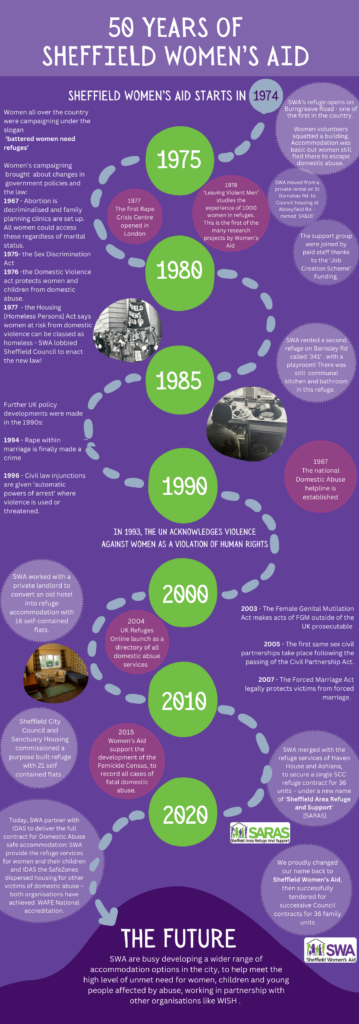

“We’re going to have to work harder”: Local transport group concerned after Haigh resignation
A local transport group is worried that the loss of Louise Haigh from the cabinet means the region could now be worse off.
The resignation of the Sheffield Heeley MP as Transport Secretary last Friday marked the first change to Sir Keir Starmer’s top team since the July election.
Fran Postlethwaite, convenor of Better Buses South Yorkshire (BBSY), said that they had formed a strong dialogue with the MP and are worried that this will set back the group’s goals of improving the region's services.
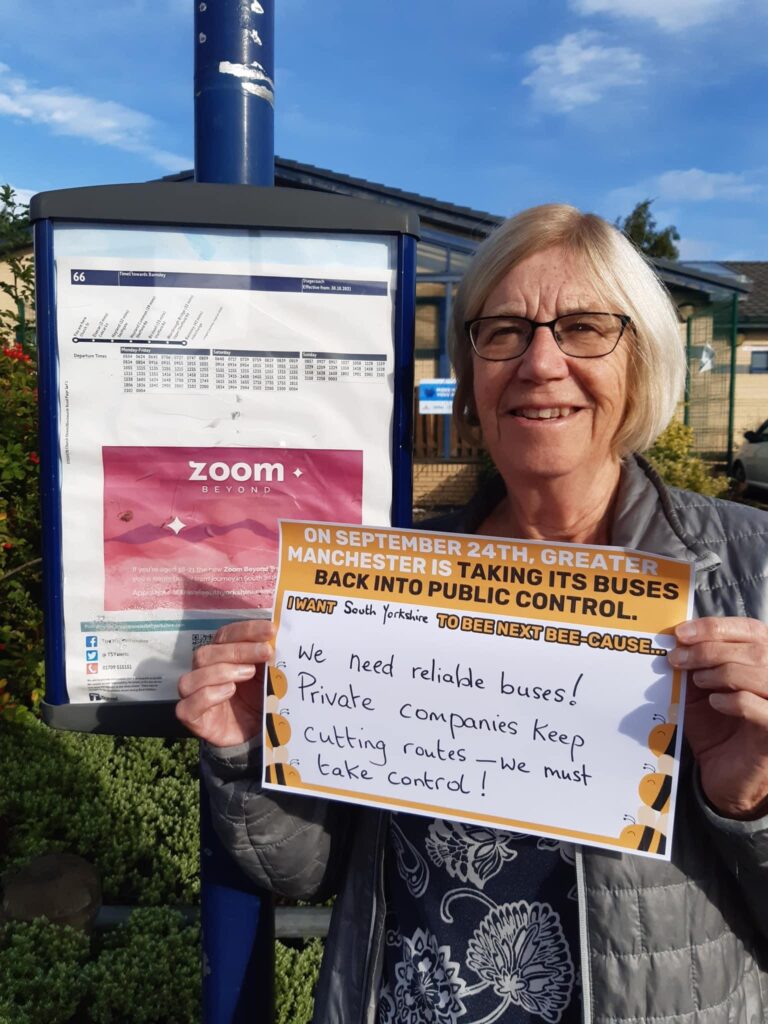
She said: “I think most of us greeted the news with some dismay, because she has been so openly committed and pushing for funding. She was very much of the north."
Haigh’s resignation comes in the middle of the public consultation on bus franchising. The South Yorkshire Mayoral Combined Authority (SYCMA) is currently seeking feedback on taking back control of the region’s buses. The consultation has already received thousands of responses ahead of the closing date on 15 January, with an announcement of the decision expected in early March.
BBSY is a broad coalition that includes disability advocates, climate campaigns, community groups, and individual passengers based around Barnsley, Doncaster, Rotherham and Sheffield. They see franchising as a key first step towards total public ownership, something that is currently not possible in law.
Fran said: “It’s not legal at the moment, the idea of public ownership. It may be, if the Better Buses Bill that Louise Haigh was promising us is still on the table.
“Lou used to come to some of our demonstrations in Sheffield…She was actually here as well as the national figure. And that's not the case with Heidi Alexander.
"You just wonder, how much is she in tune with what the situation is, particularly in the North."
South Yorkshire Mayor Oliver Coppard will now be without a fellow Sheffielder in the top transport job, only a fortnight after the two appeared together in online promotional material. The collaboration was for the announcement of £17.6m in funding for South Yorkshire buses, with transforming South Yorkshire’s transport being one of Coppard’s signature pitches when running for mayor.
Postlethwaite said this was only worth promoting given their connection: “I think it was the fact that Lou Haigh was from South Yorkshire… I don't think there's that much national interest in the idea that South Yorkshire has had less recovery… Lack of funding that has meant our bus services have crumbled even more.”
South Yorkshire is allocated one of the lowest amounts per resident for transport in the country. For instance, West Yorkshire residents receive £40 per head, compared to South Yorkshire’s £10.
“She was prepared to speak out... And I'm afraid in Labour at the moment, that doesn't seem a very popular thing to do”, Fran said.
It may not be the end of Louise Haigh’s career in the cabinet however, with Angela Rayner on Thursday championing the work of the MP: “I think Louise Haigh was a fantastic secretary of state. We have just this week announced the first rail passenger services in the south coming back into public ownership - that was Lou that did that work.
"If she wants to be in government I’m sure she’ll keep striving and will earn her place back.”
Only time will tell if South Yorkshire was just getting a good deal because of the MP.
Louise Haigh has been approached for comment.

Christmas tree festival returns to Sheffield Cathedral
Local groups have been able to promote their work through a Christmas tree festival this month.
The festival, which takes place at Sheffield Cathedral, is the fifth of its kind and is designed to promote the work of local groups in the community.
The festival includes 42 six-foot Christmas trees, all decorated by local groups, alongside the Cathedral’s three traditional trees.
Ben Rossi, one of the organisers behind the festival, said: “Each tree is individually decorated and it just makes the Cathedral look beautiful.”
The contributors include charities, Sheffield Children’s Hospital, community groups and local businesses.
Most are from Sheffield, with a few contributing from Doncaster, Rotherham and Nottinghamshire.
Mr Rossi said: “These community groups and charities use this as a chance to raise awareness of the excellent work they do in their community.”
Visitors to the festival are encouraged to vote for their favourite tree, with the winning group receiving a cash prize to help support their work.
The trees are sourced locally as well, from Whirlow Farm Education Trust In a bid to support another local community group.
They’re then chipped and recycled following the festival’s conclusion.
The festival runs until Tuesday 12 December and is free to visit at Sheffield Cathedral.
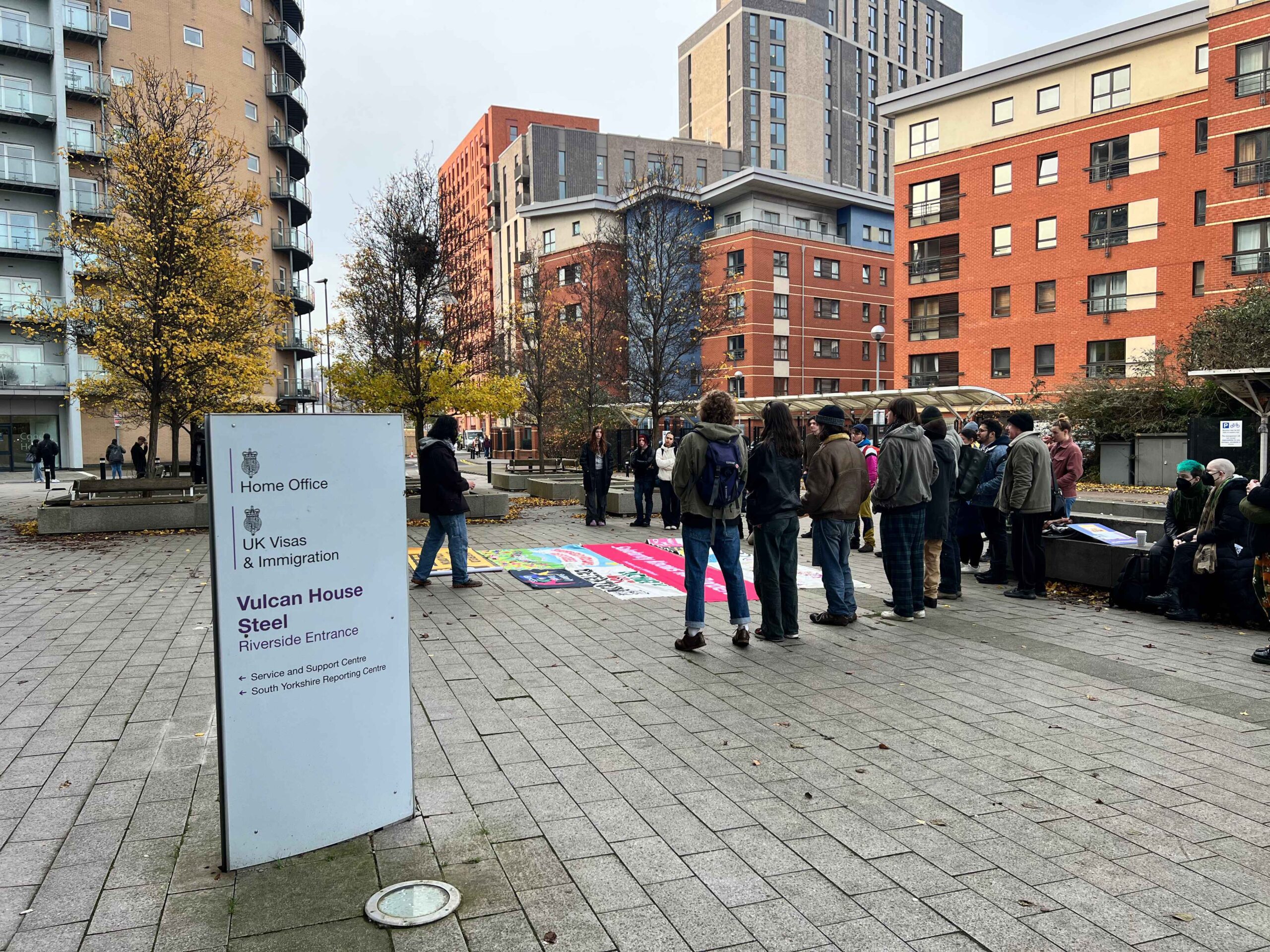
Sheffield locals express disdain at Labour’s crackdown on asylum seekers
Residents gathered today outside Sheffield’s Home Office to show their disappointment in the UK’s uptick in deportations of asylum seekers.
The focus of the demonstration was to show the state of asylum seekers in the UK with the new deportation policy under the Labour government, said Melinda Mo Martinez from City of Sanctuary, Sheffield.
The policy, introduced by Keir Starmer’s government since coming to power, says that “foreign criminals and immigration offenders” will be sent back to their home countries, and not Rwanda, unlike the Conservative government’s policy.
She said: “For me and my organisation, the most important thing is to show that behind all the data, they [asylum seekers] are human beings.
“This is not about Black, Brown and Asian people against White people, this is about fascists against our community.”
She said that the larger community in Sheffield also feels like asylum seekers across the UK are being treated like second-class citizens, referring specifically to their allowance: £49.18 per person per week, at a time when the average cost of groceries in the UK is upwards of £50 per week.
Manuchehr, a spokesperson for the South Yorkshire Migration and Asylum Action Group (SYMAAG), said that he feels deportations have increased after the Labour government was elected to power.
He referred specifically to the Labour government scrapping the Conservative government’s Rwanda charter flights, that violated international law and human rights, for a policy where “innocent and vulnerable asylum seekers are being sent back home to dictatorial regimes.”
He said that the UK should divest from nations in dispute, referring specifically to Israel, Afghanistan and Iraq, and instead invest back in asylum seekers that are escaping persecution in their home countries.
Megan, who is involved in activism around the city, attended the demonstration because she felt the government has created a hostile environment towards asylum seekers across the country to distract the public from their own failings.
She said: “It feels like they’re fueling the far-right, it doesn’t even feel like they’re just pandering to them anymore. I don’t think it’s a coincidence that his [Keir Starmer’s] policies have grown increasingly more hostile.”
The demonstration was held ahead of International Human Rights Day, which is next week, on 10 December 2024.

Sheffield workers promised “prosperity, security and dignity” as Labour pushes for zero-hour contract reform
“Exploited” zero-hour contract workers across Sheffield will be offered guaranteed hours and reasonable notice of shifts as Sheffield City Council puts it support behind the Labour’s new Employment Rights Bill.
Cllr Karen McGowan: “There are thousands of workers in Sheffield that are on a zero-hour contract and this will be a big help to many of them. It will give Sheffield workers the prosperity, security and dignity they deserve.”
On Wednesday evening, the Sheffield City Council voted to pass a motion supporting the bill.
Grace Laing, 20, who spent a year working on a zero-hour contract said: “I found it difficult to plan a life around a work schedule where nothing was guaranteed. I didn't have the same rights as someone on a fixed contract with regular hours. I didn’t feel in control of my own hours.
“I would be called at 7am and told I was expected to be there at 8:30 which meant I felt constantly on call.”
However, Cllr Kurtis Crossland defended zero-hour contracts.
“We see an attack on zero hour contracts in this budget. Some people want zero-hour contracts so let’s make them work fairly for people and not villanise them for a quick soundbite.”
Trade unions will be given greater access to the workplace to intervene in exploitative practices.
Sam Morecroft, President of Sheffield Trades Union Council said: “Every zero hour contract is exploitative. All the flexibility is with the employers and never with the worker.
“When you’re on a zero-hour contract you can’t think very far ahead. You dread the Christmas holidays where you might not have any hours and you don’t know how much you’re going to get paid or how you’re going to get through it.”
The bill requires employers to justify the refusal of flexible working requests and payment for shifts that are cancelled at short notice. It also introduces statutory sick pay.
Cllr Terry Fox: “How is it right that in the 21st century that we are still fighting for sick pay for people who give labour eight hours a day? How can it be right that we are still fighting for statutory holidays for workers?
“It is about time that workers got a chance to shout.”
Despite the proposed reforms, Mr Morecroft was “disappointed” that Labour didn’t completely ban zero hour contracts.
Fellow member of the Sheffield TUC, Bob Jeffrey said: “I think there is promise in new legislation, but it could have gone further. Workers also need to collectively organise to be able to assert their employment rights on the ground.”

Local groups criticise council plans to tackle sewage pollution
The council discussed plans to address Sheffield's sewage problems with their new proposal, 'Protect Our Rivers' on 4 December.
The debate comes after record levels of pollution in 2023, when Yorkshire Water pumped sewage into Sheffield’s rivers 4,781 times. This is equivalent to 18,000 hours, a 33% increase on the year before. The water company paid a £150,000 fine for these incidents.
The Don is now one of the 23% of UK rivers which are classed as in “poor” or “bad” health according to The Rivers Trust.
The motion, raised by Richmond councillor David Barker, urges Yorkshire Water to be transparent and to commit to reducing sewage pollution.
Seconding 'Protect Our Rivers', Councillor Mark Whittaker said: “Politicians, local and national, should be leading on this. This motion is a step in doing that.”
The Environmental Agency’s most recent EPA report now classes Yorkshire Water as a two-star company, meaning that it requires improvement.
The report also found that Yorkshire Water is one of four companies making up 90% of pollution during this time.
The local groups tackling pollution in the Don first hand say they have seen a positive change in Yorkshire Water’s approach to the environment.
The Don Catchment Rivers trust is a charity which aims to see Sheffield’s rivers thrive. Rachel Walker, their CEO, said: “We are pleased with the attitude coming from Yorkshire Water.
“It hasn’t always been this way but we feel like we are making progress. People will see some big changes coming from Yorkshire Water soon.”
Also striving to improve and connect Sheffield’s waterways is Riverlution. Managing Director Geoffrey Guy feels that while “every little helps”, the council’s plans to tackle river pollution aren’t good enough.
He said: “I see a lot of the council saying it is someone else's fault and patting themselves on the back. They need to have some introspection and accountability."
Researchers at the University of Sheffield say that it’s not just sewage from Yorkshire Water which pollutes the Don. Domestic chemicals are also ending up in the Don through a process called urban runoff.
Guy added: “It would be nice if the council recognises their position as a landowner and how this could be levered to improve water quality.”
Sheffield City Council have not yet commented.
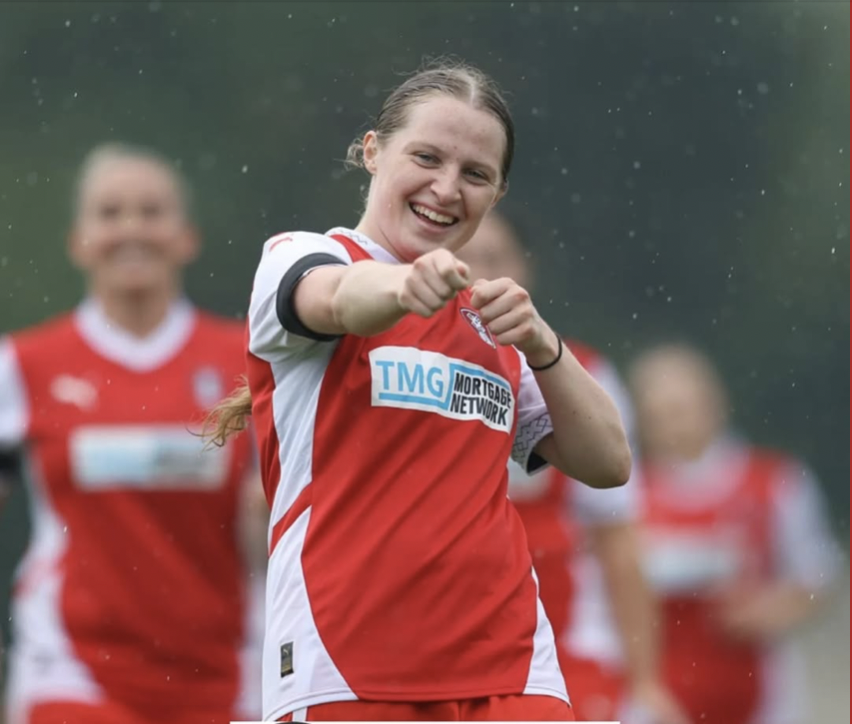
Young Rotherham star “to be the next Lioness that comes up”
A talented 17-year-old striker has been selected for the England Colleges for the second time to represent England in an international Tournament.
Rotherham United Women FC's Alesha Gale, from Herringthorpe, will represent England for the second time.
The England Colleges teams allow England’s rising sporting stars to compete at an international level alongside their studies.
Miss Gale was delighted to have been selected out of the 300 other girls who also competed in the two-stage trials.
"You just get to get an insight into all the opportunities that there actually are for women's football."
- alesha gale
The Rotherham star has been playing football since she was eight-years-old, was scouted from school, and has been dedicated to the sport ever since.
The striker earned her first cap for England during the International England Colleges Football Association (ECFA) match against Italy last year.
She said: "I just can’t wait to play another international tournament.”
England’s squad were the underdogs despite winning all three of their matches leading up to the final against Italy who had always won the tournament.
It soon became clear that the young lionesses were a force to be reckoned with, beating Italy 3-0 and bringing home the trophy.
She has been with Rotherham United Women FC since last year, and has resigned with them for another season.
Adam Rawlings, Manager of Rotherham United Women FC, expressed the club’s support for their young lioness.

He said: “We are incredibly proud of Alesha as she receives an accolade which represents the credit she deserves for all her hard work to get here which she continues to display.”
Miss Gale is inspired by the legendary lioness Ella Toone, whose impressive footwork is something that Alesha's tries to mirror.
Ella Toone, the Lioness midfielder, has earned over 50 caps for England since joining the squad in 2021.
“Watching her and learning from her skills and watching the games just makes me want to be the next lioness that comes up.”
- ALESHA GALE
This is only the beginning for the promising career of this young lioness, who is sure to make her home club proud wearing the England shirt in international matches next year.
Photo: Alex Roebuck

“You’re left in the dark, getting worse and worse” says Crohn’s sufferer
More is needed to be done to speed up the diagnosis of painful and debilitating bowel conditions according to one sufferer.
As part of Crohn’s and Colitis Awareness Week, Liam Slaney, voiced his concerns that the NHS is over-stretched leaving patients waiting months to be treated.
He said: “Although I am receiving good care now, I was in a bad way for six months with no treatment.”
Crohn’s and Colitis, known under the umbrella term of Inflammatory Bowel Disease (IBD), affects 500,000 people in the UK.
Liam, 29, from Sheffield, who was diagnosed with Crohn’s disease in January 2023, explained his path to diagnosis was very long, as he waited for doctors appointments, a colonoscopy, and his results, all while he was left in constant pain.
“I lost a lot of weight,” says Liam. “If I was any worse, I would have been hospitalised. I didn’t see anyone while I was waiting for tests and results to come through.”
Before he started experiencing symptoms, Liam, an Amazon team leader, was around 14 stone, but by the time he received his results, he was around 10 stone 4lbs.
Liam’s blood test revealed a worrying increase in his inflammatory markers, and his colonoscopy results supported his later diagnosis of Crohn’s disease.

Statistics from Crohn’s and Colitis UK, suggest that one in seven people reported they were only diagnosed with IBD during an emergency hospital admission. Data also reveals a quarter of people with IBD wait more than a year for a diagnosis, and nearly half will end up in A&E at least once before they start treatment.
Liam says: “I know it’s a wider NHS issue, but there’s a massive hole, because you’re left in the dark, getting worse and worse.”
December 1 to 7 marks Crohn’s and Colitis Awareness Week, a week-long campaign aiming to share the experiences of those living with the conditions, and push for change within the healthcare system.
As part of the ‘Face the Facts’ campaign, Crohn’s and Colitis UK commissioned the ‘IBD UK Report’ - the largest survey of people living with IBD in the UK.
Over 17,000 people shared their opinions and thoughts through the survey, and the findings concluded that: “IBD services are overstretched and under-resourced, which is having a damaging impact on the mental and physical health of those living with the conditions”.
Despite his wait for diagnosis, Liam explained the care he received under the IBD Team in Sheffield has been good. He says: “Whenever I have a blood test that comes back abnormal, they’re always helpful and prompt in their responses.”
Liam attends bi-monthly hospital appointments for immunosuppressant infusions, as part of his treatment programme.
There is currently no cure for either Crohn’s or Colitis, but the conditions can be managed through medication, and sometimes surgery.
Symptoms are often debilitating, varying from weight-loss, chronic fatigue, hair loss and dehydration, to malnutrition, joint problems, and blood and mucus when going to the toilet, which can be as frequent as 40 times per day during a flare.
For those suffering with IBD, the condition is notably unpredictable - with often periods of active remission and management being disrupted by a flare-up, and for a lot of people with IBD, the trigger is unknown.
Often, courses of steroids, hospitalisation, or even surgery is required to manage the condition during a flare up.
According to the IBD UK Report: “These conditions can lead to time off school and work, withdrawal from social relationships, and inability to carry out everyday activities.”
Liam says: “I try to take every day as it comes, and make any lifestyle changes that I need to, but it’s harder to do if you are still unwell and uncertain about everything. You have to try and stay positive, and realise there is help out there.”

Crohn’s and Colitis UK said: “Many people recognise they have symptoms, but delay contacting a healthcare professional because they feel embarrassed, scared or because they don’t have the right words to describe their symptoms.”
The charity urges those who may be reluctant to seek help to use their online symptom tracker, which advises of next steps for anyone concerned.
Liam’s partner, Jen Craven, 29, explained she watched her once ‘stocky’ partner rapidly lose weight, and that he looked very poorly.
The software business development manager explained that supporting someone with a debilitating condition can often be challenging, saying: “You can’t fix the problem, but you can try and make their surroundings nicer.”
Jen, who shares a home in Crookes with Liam, says small things such as being flexible with meals, running baths, and turning on the heated blanket before her partner gets home from work helps him in managing his Crohn’s.
Those suffering with IBD often find themselves having to explain their condition to others, which may be difficult, being met with hostility when it comes to openly talking about bowel movements and ill health.
Jen found that she was having to explain Crohn’s disease to her friends, most of whom hadn’t heard of the condition before. “You can’t expect everybody to know what everything is, but a lot of people just haven’t heard of it,” she says. “They probably don’t realise how poorly some people get with the condition.”
“When it comes to toileting, people are less likely to talk about that sort of thing as well.”
A previous campaign from Crohn’s and Colitis UK, ‘Cut the Crap’, was aimed at challenging the taboo surrounding talking about symptoms, which has often led to people ignoring their health problems, and failing to be diagnosed sooner.
As this year’s awareness week draws to a close, those who suffer with forms of IBD are still contending with delayed diagnoses, challenging symptoms, and learning to live with an underfunded and under-researched condition.
Crohn’s and Colitis UK are now calling on politicians, pharmaceutical partners and leaders in the charity sector to Face the Facts that the IBD UK Report has found, and confront urgent issues concerning the care of those with IBD.

Sheffield University staff cuts spark student calls to unite in protest
Activists have this week urged their fellow students to “get out on the concourse and demonstrate” following the University of Sheffield's announcement of staffing cuts.
Last month, the university announced a voluntary severance scheme with the intention of saving £23m in staff costs in an attempt to address a financial shortfall.
On Wednesday 4 December, a coalition of student activist groups met at the University Arms to discuss a campaign strategy. The coalition aim to convince students that the cuts will have a negative impact on their education.
This follows a vote which took place on 14 November, and was attended by 944 members of staff, 93.3% of whom voted “no confidence” in the Vice-Chancellor and University Executive Board.
The Sheffield and University of College Union (UCU) said in a post on X: “This vote reflects deep frustration and anger from staff at mismanagement. Staff and students must be prioritised, not bear the cost of short sighted decision making by university leadership. We will not stand for staff cuts; this vote is only the beginning.”
A spokesperson for the University of Sheffield said: "A range of non-staff reductions were prioritised first, including reviewing capital spend and university buildings and reducing discretionary expenditure."

The financial shortfall has been largely attributed to a reduction in the number of international students attending the university.
Charlie Thomas, a student member of the Sheffield Solidarity Group (SSG), said: “I think it is really important for students and staff to link up and campaign together.
"The students will feel the cuts too. We're going to see cuts in services and I’m sure a lot of those cuts will come from research.”
The SSG also fears that redundancies could soon become compulsory.
A spokesperson for the University said: “The sector-wide challenges mean we must remain flexible and agile to protect our excellent research and teaching, and we will be taking considered decisions to ensure the institution’s long-term sustainability and success.
“We are committed to navigating these challenges responsibly and transparently, whilst continuing to deliver an excellent student experience."
Campaign groups have argued that the staff cuts are not necessary.
Charlie said: “It’s a combination of the university management’s incompetence and a system that is unsustainable. We want the university to do better, but I also think we should be calling on the government to intervene because the university sector is falling apart altogether.”
A spokesperson for the University said: "We recognise this is a difficult time for colleagues and are firmly committed to supporting our staff and working constructively with our trade unions throughout this period, whilst maintaining the high standards of learning and teaching excellence for which Sheffield is renowned.”

Disability organisation failing students
Disabled students are struggling to enjoy university life after a system that was set up to support them is ‘failing’.
The Disabled Students’ Allowance (DSA), which underwent major reforms earlier this year, has been criticised after lengthy delays means applications are taking months to be processed, according to one blind student.
Emily Lamb, 23, a MA Journalism student at the University of Sheffield, said: “There are huge hold-ups at all stages of the application and grant process.
“A system designed to aid disabled students in accessing our education is actually causing more stress and frustration.”
The DSA is a non-means tested fund intended to help disabled students in Higher Education with study-related costs, including specialist equipment, non-medical help and travel expe
In February, the Students’ Loans Company (SLC) reformed the DSA model by appointing two suppliers, Capita and Study Tech, who are responsible for looking after disabled students' needs.
The aim was for applicants to have one point of contact, who would arrange their needs assessment, provide their equipment, training and aftercare.
It was hoped this would make the process easier, faster and better quality.
However, disabled students are still being burdened by lengthy delays, which means they are being forced to start their studies without any DSA support.
Miss Lamb, who lost her sight when she was 20, said: “I am at the end of my first semester, but I still haven’t received any support from the DSA, despite applying in summer. The system is failing students like me.”
Reportedly, the number of students applying for DSA is roughly the same as last year and therefore, what SLC would have been expecting in terms of capacity.
Emily, who has written about her experience for Sheffield Wire, explained the DSA is an essential service to ensure that students with a disability can access their course in the same way that their peers can.
Jayne Woodward, a Disability Advisor at the University of Sheffield, said: “The delays are very concerning.
“Whilst institutions have a responsibility to put reasonable adjustments in place, the access to technology and human support that comes from DSA cannot be fully replicated.”
SLC, who are adamant this is the right model for DSA, said they are working to solve the issue of waiting times.
A spokesperson for the company said: “Since the introduction of the reforms, we have removed the complexity for customers, with one supplier being responsible for the customer journey.
“We are aware the journey time is still too long in certain areas, and we are taking steps to improve it.”

Sheffield Wednesday’s Danny Röhl pushes for playoffs
Sheffield Wednesday are hoping for their third consecutive win this weekend to boost their team up the league table and strengthen their chances at the playoffs.
The Owls will be returning to Hillsborough Stadium this Saturday to play against Preston North End, with the match kicking off at 12.30pm.
Ahead of tomorrow's game, Danny Röhl, Wednesday’s Manager, said: “The big difference [last season] was about expectations and league position. Every point, every win was outstanding for us. The expectation is higher. The fans will want to see goals, they want to see nice football.”
Preston North End will also be desperate to seal the victory to end their losing streak, after failing to claim a win for the eighth time in a row against West Brom last Saturday.
The team are just three points out of the relegation zone, meaning a win for Preston North End is as crucial as ever.
Last week's away game win over Derby County saw Wednesday reach the top-half of the table at 12th, putting them six places ahead of this weekend's opponents.
Despite being more secure in this season’s league standings, the team must improve their goal difference to surpass Norwich City, Millwall, and Bristol City, who lead only on goals scored in the league table.
Röhl said: “We want to take points now, we have a good week ahead of us. Two home games with the opportunity to take six points. We want to win games, it doesn’t matter if it's home or away.”
This game could be a daunting prospect for Sheffield Wednesday, as PNE have had the upper hand in the last five encounters between the teams, winning three of the games.
Historically, Preston have won 46 matches against Wednesday, who have won 45.
Yan Valery, 25, wingback for Sheffield Wednesday, spoke on Thursday: “The last game wasn’t our best game on the ball or in different areas on the pitch. But these types of games we would have lost at the start of the season, but now it’s all about mentality and fighting together and not giving up."
He stressed that this game is vital in Sheffield Wednesday's success, and could easily determine whether the team rises or falls in the table.
Following a recent decline in home results, Valery also spoke about the impact that fans have on the matches, stating that Wednesdayites are often louder at away games than the home fans.
Valery discussed visiting hospitals and ill children this week, an initiative the club is committed to continuing before Christmas to spread joy.
Watch the video below to hear what he had to say.

Making profit after National Insurance rises “almost impossible” for small businesses
Keir Starmer’s claims to not be burdening the working person are ringing hollow among Sheffield’s small business community, with many already struggling with rising costs.
One affected business is the Steel Cauldron in Broomhall. Rob Downham, pictured here in his second role as Father Christmas, pointed out the damage that would be caused by the proposed increases to National Insurance.
“An employee with us earning around £23,000 a year is going to cost us about an extra one and a half thousand pounds in national insurance, but actually, that’s combined with the fact the minimum wage has increased by almost 40% over the last four years.
“So actually since I set up this business just over four years ago, the cost of employing a person has almost increased by 50%, and will reach 50% in April.”
The raise comes at a time when businesses have also been badly hurt by steep increases in rent and utility costs. The Steel Cauldron’s expenses on utilities alone have gone up by 500% in the past few years.
Carolina, the manager of family-owned Tropicana on Crookesmoor Road, is contemplating moving out of the area in January due to rising costs.
She said: “I would say we need more support with the bills, rent, something. In this area, you need to work really hard to be able to pay the rent.
As a business, we’re keeping people together, we’re giving them space you know? Because this is all about social life."
Many are not convinced by the extent of these difficulties.
President of Sheffield’s Trade Union Council Sam Morecroft argues that small businesses often exaggerate the extent of trouble they face. Whilst he approves of extra financial aid to be offered to legitimate cases, Sam calls on owners to “open up their books” to receive help.
“Do I have a problem with employers paying more? No, absolutely not.”
He continued: “In genuine cases, where small businesses can’t afford to pay the new minimum wage or pay their national insurance contributions, fair enough. Particularly if it’s something that people want in their communities to keep running.”
Additional reporting by Nicole Taylor
